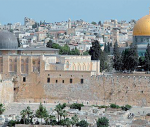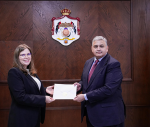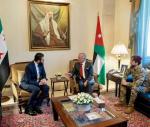You are here
Restoring the public trust
Sep 28,2021 - Last updated at Sep 28,2021
This week, the Royal Committee to Modernise the Political System has completed the majority of its work by endorsing draft election and political parties’ laws, as well as constitutional amendment proposals. Nonetheless, the mission is expected to be completed by the end of the month, with the preparation of a policy paper and a document summarising its outcomes and submission to His Majesty King Abdullah. Thus far, all subcommittees have submitted proposals and draft laws, and the committee's general assembly this week endorsed the draft election law and proposals for constitutional amendments relating to election laws, political parties, and parliamentary oversight mechanisms.
Elections are, without a doubt, the bedrock of democracy, and drafting election laws is a critical undertaking for any nation. As such, the Committee has made every effort to ensure the drafting of a modern law that guarantees Jordanians are represented fairly and that people have fair and free elections. The committee has also focused on the fact that the election and pollical parties’ laws outcomes send positive messages, that will undoubtedly contribute to reform advancement and allow us all to proceed in gradual stages toward the goal; It is a partisan parliament that results in a programmatic parliamentary government that delivers tangible results for citizens. As at the end of the day, people simply want to meet their basic needs and live-in dignity in a country free of corruption and divisions that negatively impact people's lives and keep them from progressing toward democracy.
According to the draft elections law, the House of Representatives will have 138 members, distributed among 18 local electoral districts and one general national district. Additionally, there will be a closed, proportional general constituency with 30 per cent of seats and 41 seats at the national level, as well as constituencies with 97 seats at the local level. Local electoral districts will be as follows: Amman will have three districts, Irbid will have two districts, and the remaining governorates will have one district and three Bedouin districts.
The Committee worked to ensure that all Jordanians had a fair shot at reaching Parliament and effectively contributed to improving the electoral process and ensuring its integrity. The committee recommended that electoral campaigns be limited to a maximum of JD100,000 for candidates in local constituencies and JD500,000 for national lists. The candidate is also required to disclose the source of funding, and in the event of unjustified expenses or funding, the candidate faces a penalty of 50 per cent of the value of the expenditure or dismissal from the Parliament. Additionally, locations for electoral propaganda have been identified, which will be supervised by Greater Amman Municipality and by the municipalities in the governorates.
For the first time, the Independent Electoral Commission's instructions to ensure the integrity of the elections, were incorporated into the election law, with severe penalties including fines, imprisonment, dismissal from Parliament, and disqualification from standing in elections. As a result, any election tampering, or interference will be regarded as electoral crimes. All of this will reestablish trust in the electoral process, as well as in parties.
it is unwise for us to continue thinking about political parties and political participation in the same way we have in the past in the new centennial. Today, we enter a new era of development and modernisation, during which work is being done to broaden decision-making participation and to ensure Jordanians' right to live a parliamentary and partisan life that advances their democracy and lives, contributes to the realisation of their aspirations, and creates a legislative and political environment conducive to these goals. Today, everyone should seize this historic opportunity by engaging in partisan work and active political participation in order to achieve the desired reform and democracy.
Lena Aloul is a member of the Royal Committee to Modernise the Political System












